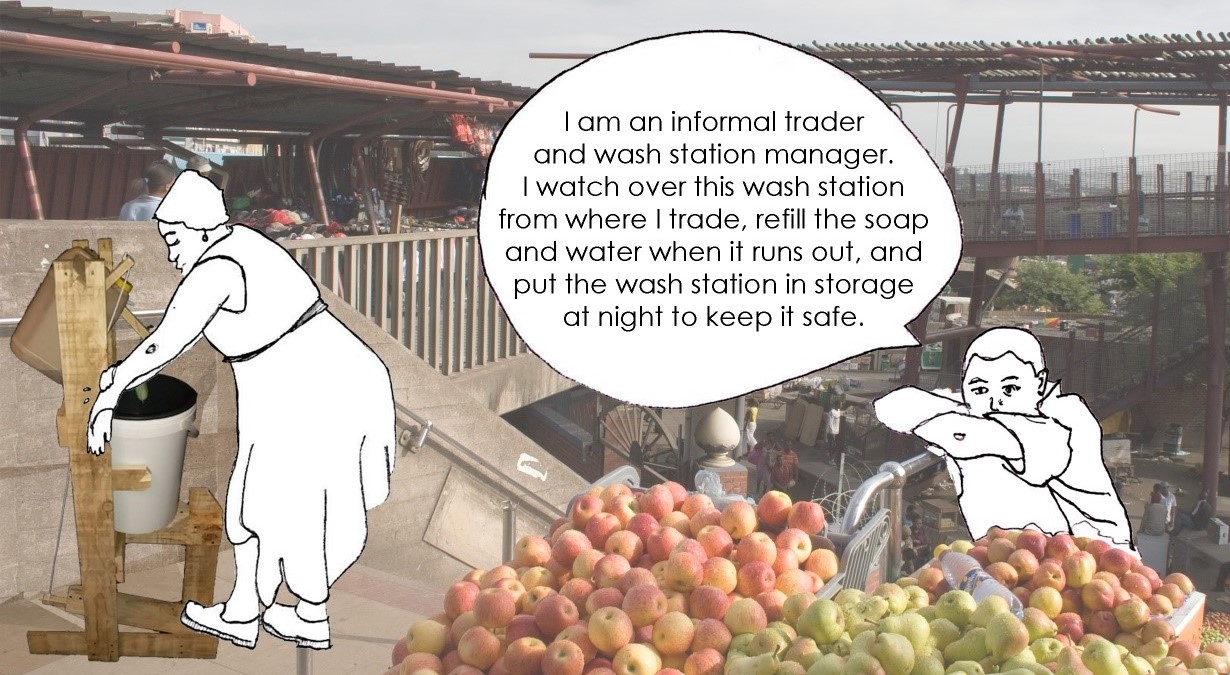Rebecca Plumbley
As the national lockdown is gradually relaxed, AeT is preparing for the reoccupation of Warwick Junction. It is pressing to consider what a return to work might look like and to put occupational health and safety measures in place to protect both informal workers and their customers. In addition to the 6000 informal workers and close to 500 000 commuters that normally occupy the area, it is anticipated that there will be additional pressure on the system from new informal workers as a result of economic downturn and subsequent job losses during the lockdown period.
In order for informal workers to operate within the health guidelines put out by the South African Department of Health and the WHO, which include social distancing measures and frequent handwashing, trading infrastructure will need to be adapted to respond to health risks. In particular, complexities around physical distancing between traders will need to be addressed in consultation with local authorities and trader leaders to ensure the safe and equitable use of space.
Hand hygiene is a key pillar of prevention. Whilst hand sanitizers are an alternative to soap and water handwashing, the distribution of these will not be sustainable in the long term. It is critical to increase access to handwashing facilities in Warwick Junction. AeT urges the municipality to ensure the safe operations of their public ablution facilities, including frequent cleaning and maintenance. In addition, AeT proposes a series of handwashing interventions to supplement existing infrastructure. The proposed interventions and management strategies are based on existing knowledge of the informal economy in Durban, and international precedent for handwashing practices and interventions in public spaces that have arisen as a result of the COVID-19 pandemic. In particular, AeT is interested in models of voluntary community management for wash stations, which could work well in our context. For example, in Kibera, Nairobi, an organization has set up wash stations at the entrances to the informal settlement which are attended to by volunteers. This role will be elaborated on further later in the development and documentation of our interventions, but the key role of the volunteers will be to manage the wash station throughout the day. Further details of the precedent study can be found here.

The proposed interventions cater to two trade typologies in Warwick: the ‘street corner typology’ and the ‘tabletop typology’. Street corner refers to public spaces in which traders and pedestrians are in close proximity. Some informal workers in these areas do not trade off of fixed infrastructure- the ‘street corner’ intervention would cater to these traders, but also to the more mobile informal workers in the area. Tabletop refers to a type of wash station that individual traders could have on their trading tables, in order to wash their hands in between interactions with customers.



It is AeT’s hope that informal workers, or interested members of the public, will be able to build their own versions of the wash stations. The solutions aim to make use of easily accessible recycled materials. AeT is in the process of fund raising to implement the first demonstration installations – the next step will be to put together construction manuals for the two prototypes.
References:
Global Citizen. (2020). ‘One World: Together At Home’: Meet Some of Our COVID-19 Regional Response Partners. Retrieved from: https://www.globalcitizen.org/en/content/regional-response-partners-together-at-home/
Republic of South Africa Department of Health. (2020a). 4 Precautions to follow to avoid being infected. Retrieved from: https://sacoronavirus.co.za/2020/03/12/4-precautions-to-follow-to-avoid-being-infected/
Republic of South Africa Department of Health. (2020b). How COVID-19 Coronavirus spreads. Retrieved from: https://sacoronavirus.co.za/2020/03/12/how-covid-19-coronavirus-spreads/
SHOFCO. (2020). SHOFCO’s COVID-19 Response. Retrieved from: https://www.shofco.org/covid-19/


